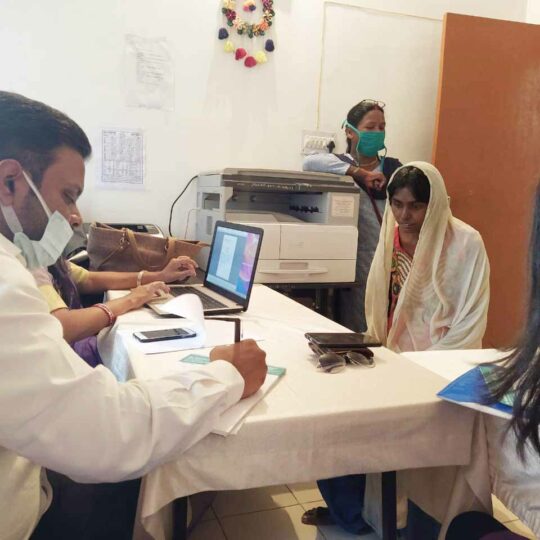All Departments
Emergency Cases
+91 9693493036Opening Hours
- Saturday - Monday: 10:00 am - 7:30 pm

Adult Psychiatry
Adult psychiatry deals with diagnosing, assessing and treating mental illness in people above 18 years. Unlike general psychiatry, it focuses on mental and psychosocial issues that develop in individuals in their adulthood. Adult psychiatry deals with disorders in a person’s thinking, behavioral changes, and constant mood swings. It usually affects their personal and professional relationships forcing them to start abusing alcohol and drugs. In general, Adult psychiatry deals with several disorders whose level of symptoms can vary from individual to individual.
● Anxiety
● Schizophrenia
● OCD
● Phobias
● Adjustment Disorder
● Post-Traumatic Stress Disorder
● Eating Disorder
Schizophrenia is a serious mental disorder in which people interpret reality abnormally. Schizophrenia may result in some combination of hallucinations, delusions, and extremely disordered thinking and behavior that impairs daily functioning, and can be disabling. People with schizophrenia require lifelong treatment. Early treatment may help get symptoms under control before serious complications develop and may help improve the long-term outlook. Schizophrenia involves a range of problems with thinking (cognition), behavior and emotions. Signs and symptoms may vary, but usually involve delusions, hallucinations or disorganized speech, and reflect an impaired ability to function. Symptoms may include Delusions. These are false beliefs that are not based on reality. For example, you think that you’re being harmed or harassed; certain gestures or comments are directed at you; you have exceptional ability or fame; another person is in love with you; or a major catastrophe is about to occur. Delusions occur in most people with schizophrenia. Hallucinations. These usually involve seeing or hearing things that don’t exist. Yet for the person with schizophrenia, they have the full force and impact of a normal experience. Hallucinations can be in any of the senses, but hearing voices is the most common hallucination. Disorganized thinking (speech). Disorganized thinking is inferred from disorganized speech. Effective communication can be impaired, and answers to questions may be partially or completely unrelated. Rarely, speech may include putting together meaningless words that can’t be understood, sometimes known as word salad. Extremely disorganized or abnormal motor behavior. This may show in a number of ways, from childlike silliness to unpredictable agitation. Behavior isn’t focused on a goal, so it’s hard to do tasks. Behavior can include resistance to instructions, inappropriate or bizarre posture, a complete lack of response, or useless and excessive movement. Negative symptoms. This refers to reduced or lack of ability to function normally. For example, the person may neglect personal hygiene or appear to lack emotion (doesn’t make eye contact, doesn’t change facial expressions or speaks in a monotone). Also, the person may lose interest in everyday activities, socially withdraw or lack the ability to experience a pleasure. Symptoms can vary in type and severity over time, with periods of worsening and remission of symptoms. Some symptoms may always be present. In men, schizophrenia symptoms typically start in the early to mid-20s. In women, symptoms typically begin in the late 20s. It’s uncommon for children to be diagnosed with schizophrenia and rare for those older than age 45. When to see a doctor: People with schizophrenia often lack awareness that their difficulties stem from a mental disorder that requires medical attention. So it often falls to family or friends to get them help. Helping someone who may have schizophrenia If you think someone you know may have symptoms of schizophrenia, talk to him or her about your concerns. Although you can’t force someone to seek professional help, you can offer encouragement and support and help your loved one find a qualified doctor or mental health professional. If your loved one poses a danger to self or others or can’t provide his or her own food, clothing, or shelter, you may need to call other emergency responders for help so that your loved one can be evaluated by a mental health professional. In some cases, emergency hospitalization may be needed.
Post-Traumatic Stress Disorder (PTSD)
Post-traumatic stress disorder (PTSD) is a mental health condition that’s triggered by a terrifying event — either experiencing it or witnessing it. Symptoms may include flashbacks, nightmares and severe anxiety, as well as uncontrollable thoughts about the event. Most people who go through traumatic events may have temporary difficulty adjusting and coping, but with time and good self-care, they usually get better. If the symptoms get worse, last for months or even years, and interfere with your day-to-day functioning. Intrusive memories Symptoms of intrusive memories may include :
• Recurrent, unwanted distressing memories of the traumatic event
• Reliving the traumatic event as if it were happening again (flashbacks)
• Upsetting dreams or nightmares about the traumatic event
• Severe emotional distress or physical reactions to something that reminds you of the traumatic event
• Avoidance
• Symptoms of avoidance may include
• Trying to avoid thinking or talking about the traumatic event
• Avoiding places, activities or people that remind you of the traumatic event
• Negative changes in thinking and mood
• Symptoms of negative changes in thinking and mood may include
• Negative thoughts about yourself, other people or the world
• Hopelessness about the future
• Memory problems, including not remembering important aspects of the traumatic event
• Difficulty maintaining close relationships
• Feeling detached from family and friends
• Lack of interest in activities you once enjoyed
• Difficulty experiencing positive emotions
• Feeling emotionally numb Changes in physical and emotional reactions
Symptoms of changes in physical and emotional reactions (also called arousal symptoms) may include
• Being easily startled or frightened
• Always being on guard for danger
• Self-destructive behavior, such as drinking too much or driving too fast
• Trouble sleeping
• Trouble concentrating
• Irritability, angry outbursts or aggressive behavior
• Overwhelming guilt or shame for children 6 years old and younger, signs and symptoms may also include
• Re-enacting the traumatic event or aspects of the traumatic event through play
• Frightening dreams that may or may not include aspects of the traumatic event
• Intensity of symptoms
• PTSD symptoms can vary in intensity over time. You may have more PTSD symptoms when you’re stressed in general, or when you come across reminders of what you went through. For example, you may hear a car backfire and relive combat experiences. Or you may see a report on the news about a sexual assault and feel overcome by memories of your own assault.
• When to see a doctor
• If you have disturbing thoughts and feelings about a traumatic event for more than a month, if they’re severe, or if you feel you’re having trouble getting your life back under control, talk to your doctor or a mental health professional. Getting treatment as soon as possible can help prevent PTSD symptoms from getting worse.
• If you have suicidal thoughts If you or someone you know has suicidal thoughts, get help right away through one or more of these resources
• Reach out to a close friend or loved one.
• Make an appointment with your doctor or a mental health professional.


